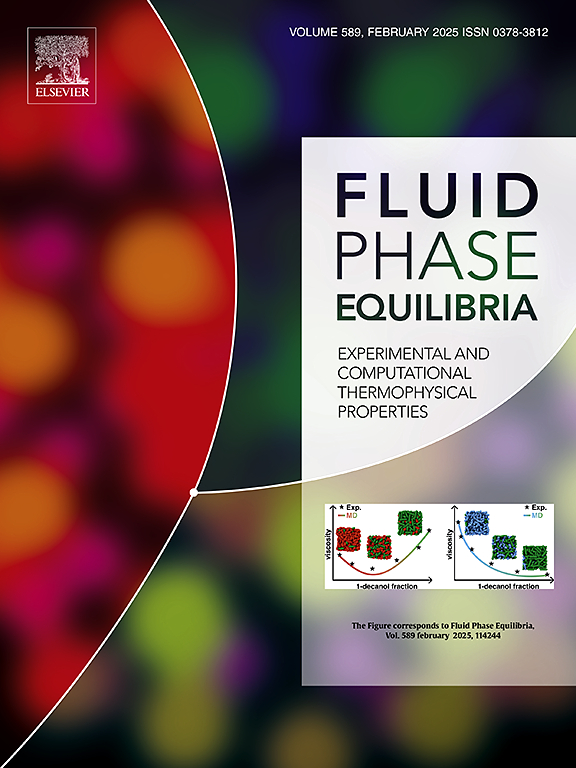Experimental data and thermodynamic modeling for n-propane + Brazil nut oil at high pressures
IF 2.8
3区 工程技术
Q3 CHEMISTRY, PHYSICAL
引用次数: 0
Abstract
This research aimed to uncover essential phase transition data for the pseudo-binary system of n-propane and Brazil nut oil. Over a range of temperatures from 313 to 343 K and pressures up to 3.42 MPa, our study identified various phase equilibria, including liquid-vapor, liquid-liquid, and liquid-liquid-vapor, using the visual synthetic-static variable volume method. The observed phase transitions fall under the type III classification proposed by Scott van Konynenburg. Leveraging the cubic Peng-Robinson equation of state with the van der Waals mixing rule, we were able to construct isopleths for the proposed system. Additionally, we examined the fatty acid profile of Brazil nut oil to accurately quantify its composition and estimate critical properties of the pseudo component in line with Kay's rule. This research provides critical insights into the behavior of phase diagrams for pressurized fluid-based extraction and separation processes, which are crucial for achieving maximum yield and minimizing energy expenditure.
正丙烷+巴西坚果油在高压下的实验数据和热力学模型
这项研究旨在揭示正丙烷和巴西坚果油伪二元体系的基本相变数据。在 313 至 343 K 的温度范围和高达 3.42 MPa 的压力范围内,我们的研究采用可视化合成-静态可变体积法确定了各种相平衡,包括液-气、液-液和液-液-气。观察到的相变属于 Scott van Konynenburg 提出的 III 型分类。利用彭-罗宾逊立方状态方程和范德瓦耳斯混合规则,我们能够为提议的系统构建等值线。此外,我们还研究了巴西坚果油的脂肪酸谱,以准确量化其成分,并根据凯氏规则估算出伪成分的关键属性。这项研究为基于加压流体的萃取和分离过程的相图行为提供了重要见解,这对于实现最高产量和最低能源消耗至关重要。
本文章由计算机程序翻译,如有差异,请以英文原文为准。
求助全文
约1分钟内获得全文
求助全文
来源期刊

Fluid Phase Equilibria
工程技术-工程:化工
CiteScore
5.30
自引率
15.40%
发文量
223
审稿时长
53 days
期刊介绍:
Fluid Phase Equilibria publishes high-quality papers dealing with experimental, theoretical, and applied research related to equilibrium and transport properties of fluids, solids, and interfaces. Subjects of interest include physical/phase and chemical equilibria; equilibrium and nonequilibrium thermophysical properties; fundamental thermodynamic relations; and stability. The systems central to the journal include pure substances and mixtures of organic and inorganic materials, including polymers, biochemicals, and surfactants with sufficient characterization of composition and purity for the results to be reproduced. Alloys are of interest only when thermodynamic studies are included, purely material studies will not be considered. In all cases, authors are expected to provide physical or chemical interpretations of the results.
Experimental research can include measurements under all conditions of temperature, pressure, and composition, including critical and supercritical. Measurements are to be associated with systems and conditions of fundamental or applied interest, and may not be only a collection of routine data, such as physical property or solubility measurements at limited pressures and temperatures close to ambient, or surfactant studies focussed strictly on micellisation or micelle structure. Papers reporting common data must be accompanied by new physical insights and/or contemporary or new theory or techniques.
 求助内容:
求助内容: 应助结果提醒方式:
应助结果提醒方式:


